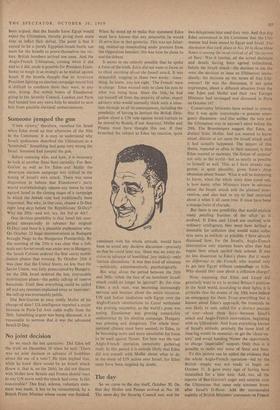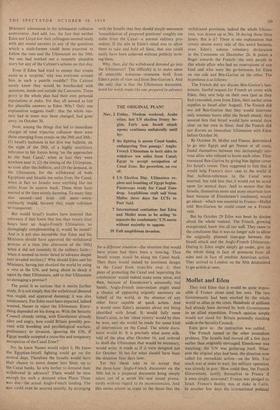The day
So we come to the day itself, October 30. On that day Mollet and Pineau arrived at No. 10. The same day the Security Council met, and the two delegations later used their veto. And that day Eden announced in the Commons that the Ulti- matum had been issued to Egypt and Israel. The
discussion that took place at No. 10 in those three hours is among the'inost critical of all 'the secrets
of Suez.' Was it routine, all the actual decisions and details having been agreed beforehand, before the Israeli attack—the decision to use the veto; the decision to issue an Ultimatum imme- diately; the decision on the terms of that Ulti- matum? Or was the discussion, if not quite impromptu, about a different situation from the one Eden and Mollet and their two Foreign Ministers had envisaged and discussed in Paris on October 16?
Conservative Ministers have wished to convey that it was quite impromptu—a genuine emer- gency discussion--and that neither the veto nor the Ultimatum was in anyone's mind before the 29th. The Brombergers suggest that Eden, as distinct from Mollet, had not wanted to know about, discuss or act upon the Israeli attack until it had actually happened. The import of this theme, repeated so often in their account, is that Eden wanted to maintain 'the fiction of surprise' not only to the world—but as nearly as possible to himself as well. This, as I have already sug- gested, is quite plausible, given Eden's deep obsession about Nasser. What it will be interesting to know, when the whole story does come out, is how many other Ministers knew in advance about the Israeli attack and the planned inter- vention, and also had to try to feel surprised about it when it all came true. It must have been a strange form of charade.
But there is one possibility that would explain many puzzling features of the affair as it evolved. If Eden and Lloyd are credited with ordinary intelligence, they must have devised a timetable for collusion that would make collu- sion seem as unlikely as possible. I have already discussed how, for the Israelis, Anglo-French intervention only nineteen hours after they had begun their attack spoiled their scheme. It was no less disastrous to Eden's plans. But it made no difference to the French, who wanted only to get into Egypt without camouflage or frills. Why should they care about a collusion charge?
Now, assuming that Eden and Lloyd did genuinely want to try to protect Britain's position in the Arab world, according to their lights, it is probable that the events of the 30th were indeed an emergency for them. From everything that is known about Eden's approach, the timetable he was likely to seek called for a distinct passage of tune—about three days—between Israel's attack and Anglo-French intervention, beginning with an Ultimatum. And from everything known of Israel's attitude, precisely the same kind of time-lag would be essential—to get the 'clean vic- tory' and avoid handing Nasser the opportunity to charge 'imperialist' support. Only thus is it possible to make any sense of Sinai and Suez.
To this picture can be added the evidence that the whole Anglo-French operation—led by the British--simply was not ready to begin on October 31. It gave every sign of having been timetabled for a later date. Add, too, all the reports of Ben-Gurion's anger and surprise over the Ultimatum that came only nineteen hours after Israel's D-Hour. Add the unconcealed asperity of British Ministers' comments on French Ministers' admissions in the subsequent collusion controversy. And add, too, the fact that neither Eden nor Lloyd nor their colleagues seemed ready with any sound answers to any of the questions which a sixth-former could have expected to follow the veto and the Ultimatum on the 30th. No one had worked out a remotely plausible story for any of the Cabinet's actions on that day.
Even if Eden had tried to ensure that events came as a 'surprise,' why was everyone around him in such a puerile muddle? The Cabinet surely knew they would be bombarded with questions, inside and outside the Commons. Those privy to the whole plan had their own personal reputations at stake. Yet they all seemed as lost for plausible answers as Eden. Why? Only one explanation suggests itself': that the whole ven- ture had in some way been changed, had gone awry. on October 30.
Now, among the things that led to immediate charges of total tripartite collusion there were three emerging from events on the 29th and 30th: (1) Israel's inclusion in her first war bulletin, on the night of the 29th, of a highly unmilitary reference to her forces being `on the approaches to the Suez Canal,' when in fact they were nowhere near it; (2) the timing of the Ultimatum, so soon after this bulletin; and (3) the demand, in the Ultimatum, for the withdrawal of both Egyptians and Israelis ten miles from the Canal, when in fact no Israelis were anything like ten miles from its eastern bank. These three facts seemed at the time utterly damning. To many they also seemed—and must still seem—extra- ordinarily stupid, because they made collusion so transparent.
But would Israel's leaders have inserted that reference if they knew that less than twenty-four hours later an Anglo-French Ultimatum, so damagingly complementing it, would be issued? And is it not also incredible that Eden and his Ministers should have approved the withdrawal proviso at a time (the afternoon of the 30th) when it did not remotely fit the military facts— when it seemed to invite Israel to advance deeper into invaded territory? Why should Eden and his Ministers, having just shocked the world by using a veto at the UN, and being about to shock it again by their Ultimatum, add to that Ultimatum so damaging a proviso?
The point is so curious that it merits further study. It is not simply that the withdrawal demand was stupid, and appeared damning; it was also unnecessary. For Eden must have expected, indeed wanted, Nasser to reject the Ultimatum. Every- thing depended on his doing so. With the Security Council already sitting, with Eisenhower already alert and angry, how could Britain possibly pro- ceed with bombing and psychological warfare, preliminary to invasion, ignoring the UN, if Egypt meekly accepted a cease-fire and temporary Occupation of the Canal Zone?
No, he knew Nasser would reject it. He knew the Egyptian-Israeli fighting could go on for several days. Therefore the Israelis would have their chance to move deeper into Sinai, up to the Canal banks. So why bother to demand their Withdrawal in advance? There would be time enough for such a demand when Phase Three was due—the actual Anglo-French landing. The aim could even be secured secretly, by arranging with the Israelis that they should simply announce 'consolidation of prepared positions' roughly ten miles from the Canal—a normal military pro- cedure. If the aim in Eden's mind was to allow them to take and hold all Sinai, that aim could easily have been achieved without publicly invit- ing them.
Why, then, did the withdrawal demand go into the Ultimatum? The difficulty is to make sense of ostensible nonsense—nonsense both from Eden's point of view and from Ben-Gurion's. And the only clue is that the Ultimatum document, word for word, reads like one prepared in advance THE ORIGINAL PLAN?
Nov. 2 Friday. Moslem' weekend, Arabs relax; last US election frenzy be- gins. Early a.m. Israeli attack opens; continues unilaterally until by: 5 the fighting is across Canal banks, endangering 'free passage.' Anglo- French Ultimatum to both sides to withdraw ten miles from Canal; Egypt to accept occupation of Canal Zone. Ike powerless, on eve of: 6 US Election Day. Ultimatum ex- pires and bombing of Egypt begins. Paratroops ready for Canal Zone drop. Amphibious craft sail from Malta: three days for LCTs to Port Said.
7 International confusion: but Eden and Mollet seem to be acting 'to separate the combatants.' UN meets without majority to oppose.
10 Full amphibious invasion.
for a different situation—the situation that would have arisen had there been a time-lag. Then Israeli troops would be along the Canal bank. Then there would indeed be imminent danger to the Canal from cross-fire over it; then pleas of protecting the Canal and `separating the combatants' would indeed make some sense; and then, because of Eisenhower's assumedly tied hands, Anglo-French intervention might stand a chance of appearing urgently necessary on behalf of the world, in the absence of any other force capable of quick action. And it would meet Eden's anxieties about not being identified with Israel. It would fully meet Israel's aims, as her 'clean victory' would by then be won, and she would be ready for some kind of intervention on the Canal. The whole docu- ment would fit. It is precisely what some aide, told of the plan after October 16, and ordered to draft the Ultimatum that would be necessary, would write. It reads as if it were designed not for October 30 but for what should have been the situation four days later.
Yet this thesis asks us to accept that the three-hour Anglo-French discussion on the 30th led to a prepared document being simply taken out of a secret file and issued prema- turely without regard to its inconsistencies. And this seems almost as crazy as the thesis that the withdrawal provision, indeed the whole Ultima- tum, was drawn up at No. 10 during those three hours. But is it? There is one explanation that covers almost every side of this weird business, even Eden's solemn voluntary declaration in the Commons on December 20. It points a finger towards the French—the only people in this whole affair who had no reservations of any kind and who were the go-betweens for Eden on one side and Ben-Gurion on the other. The hypothesis is as follows: The French did not discuss Ben-Gurion's last- minute, fearful request for French air cover with Eden; they sent help on their own (just as they had concealed, even from Eden, their earlier arms supplies to Israel after August). The French did not tell Ben-Gurion that they would intervene only nineteen hours after the Israeli attack; they assured him that Israel would have several days clear on her own in Sinai. And the French did not discuss an immediate Ultimatum with Eden before October 30.
By October 30, Mollet and Pineau, determined to go into Egypt and get Nasser at all costs, found themselves between two increasingly ner- vous allies who refused to know each other. They reassured Ben-Gurion by giving him fighter cover for Israel's towns. They suggested to him that it would help France's later case to the world if that bulletin-reference to the Canal were inserted; but told him that it would not be acted upon for several days. And to ensure that the Israelis, themselves more and more uncertain (not least because of Eisenhower's readiness), would go ahead--which was essential to France—Mollet told Ben-Gurion he could count on a French veto.
But by October 29 Eden was beset by doubts about the whole venture. The French, growing exasperated, knew this all too well. They came to the conclusion that it was no longer safe to allow the originally planned time-gap between the Israeli attack and the Anglo-French Ultimatum. During it, Eden might simply go under, give up the whole thing in face of pressures from all sides and in face of resolute American action. They arrived in London on the 30th determined to get action at once.











































 Previous page
Previous page